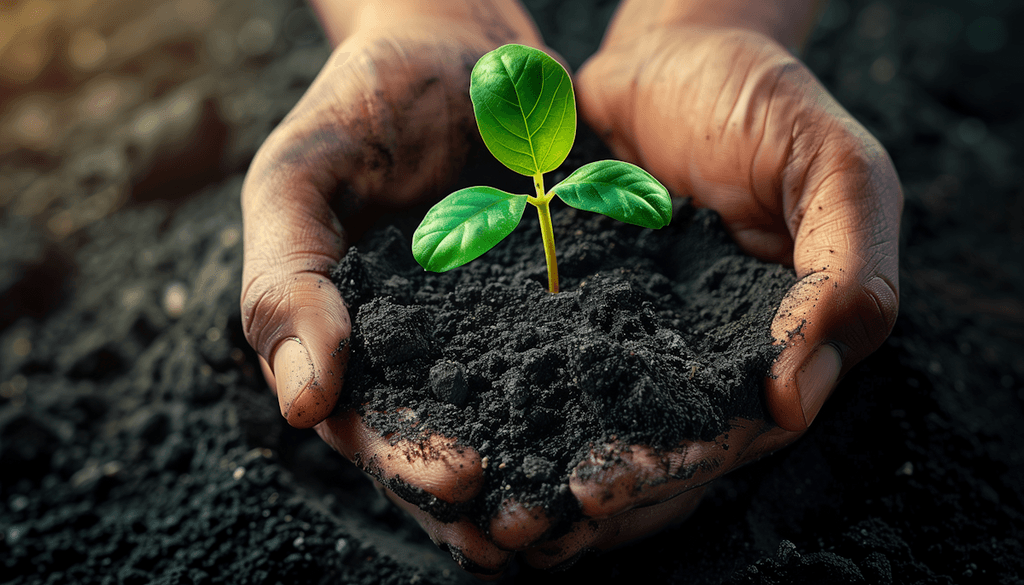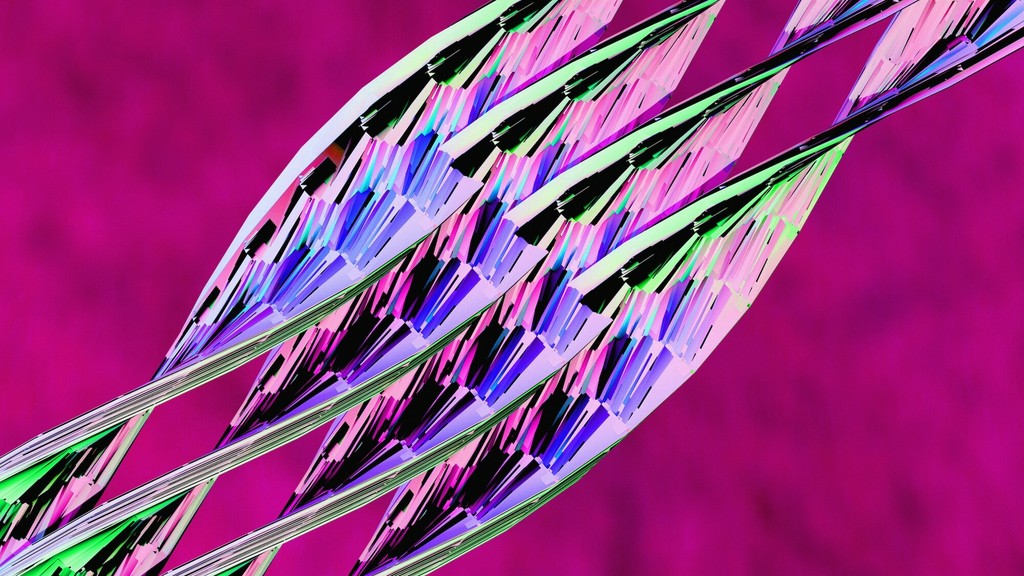Why Checking Your phone in the Morning isn't a Good Idea
80% of people use their smartphones within 15 minutes of waking up (!) In France, 68% of Generation Y (ages 25-40) use their smartphones before even getting out of bed. For Generation Z (ages 18-24), it's 77%, and still 44% for those aged 41-56. Using your phone quickly after waking up has become a reflex for most people—a reflex that obviously didn't exist 15 years ago. This week, we tried to explore what that implies.
Wellbeing
Nov 25, 2024
6 min



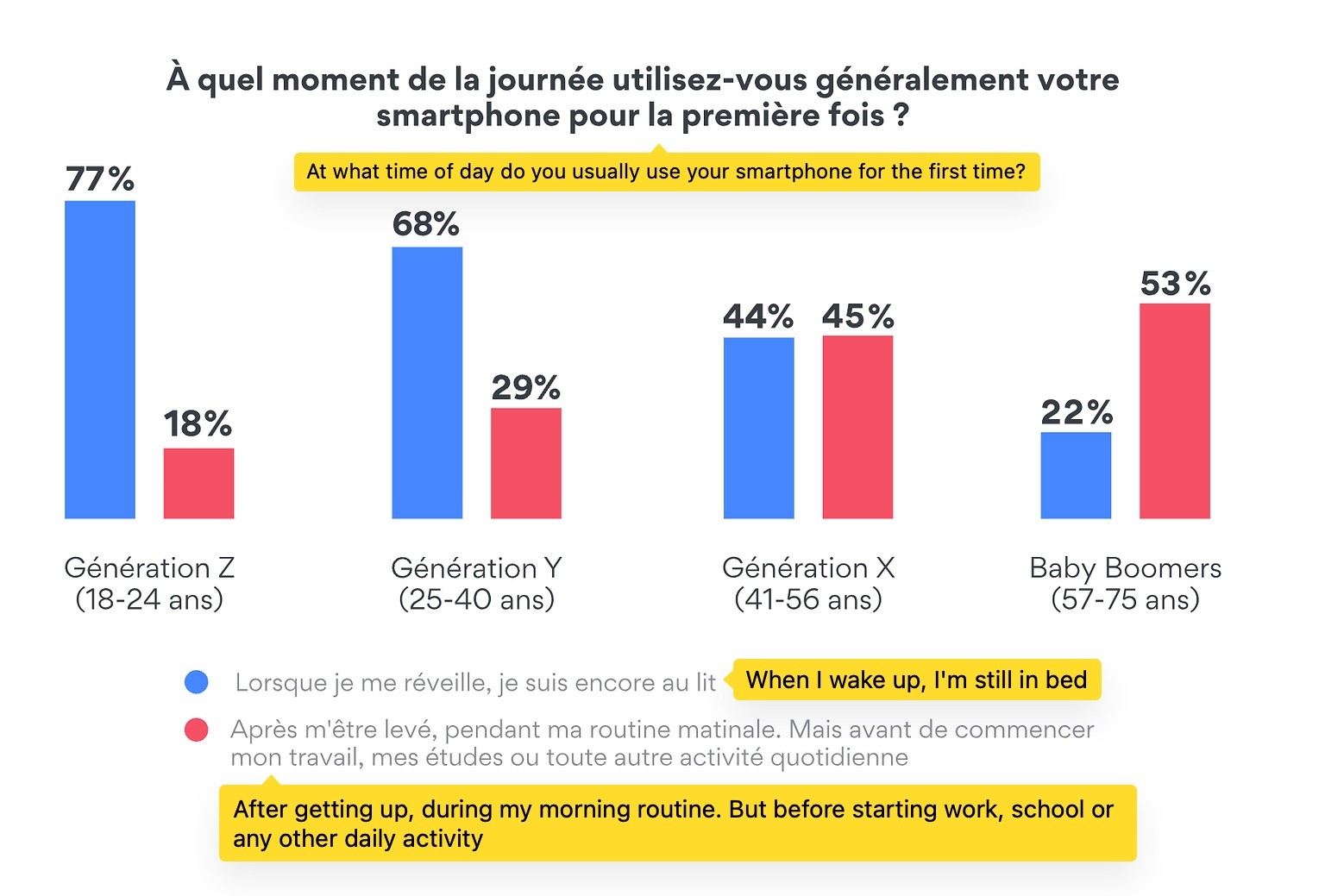
🧠 The Explanation: What are the impacts of this habit?
We tend to think that the brain rests when we sleep.
A persistent myth, though completely false. Scientific literature shows that the brain works tirelessly during the night. It sorts and then consolidates the thousands of pieces of information and memories it has processed throughout the day. It prepares the ground so that when we wake up, we are ready to make more thoughtful decisions.
The saying “the night brings counsel” finally makes sense.
🌊 From one brain wave to another
The brain functions like an electric generator, orchestrating communication between neurons.
These exchanges generate specific rhythms. When a group of neurons sends a burst of electrical impulses to another, it creates a pattern resembling a wave.
Depending on our state of consciousness, these rhythms vary. When you are in deep sleep, your brain emits delta waves.
As soon as you wake up, the brain’s electrical activity naturally produces theta waves.
This is a state of daydreaming, the frequency of deep relaxation. It is the moment where you draw your creative inspiration. It’s the perfect time to visualize your priorities and align your actions with that vision.
Then, when you are more awake but still relaxed and not processing much information, your brain begins to produce alpha waves. This is the moment when the brain is focused inward, like during meditation.
By picking up your phone as soon as you wake up and diving immediately into the Internet (#boomer), you force your body to skip the steps of emitting both theta AND alpha waves.
You jump directly from the delta state to a state of full wakefulness and alertness, also known as the beta state. By skipping these natural steps, you lose the opportunity to take the time to identify what matters and take the right direction for the day.
Psychiatrist Nikole Benders-Hadi even tells us:
| “The information overload that hits you before you are fully awake interferes with your ability to prioritize tasks.”
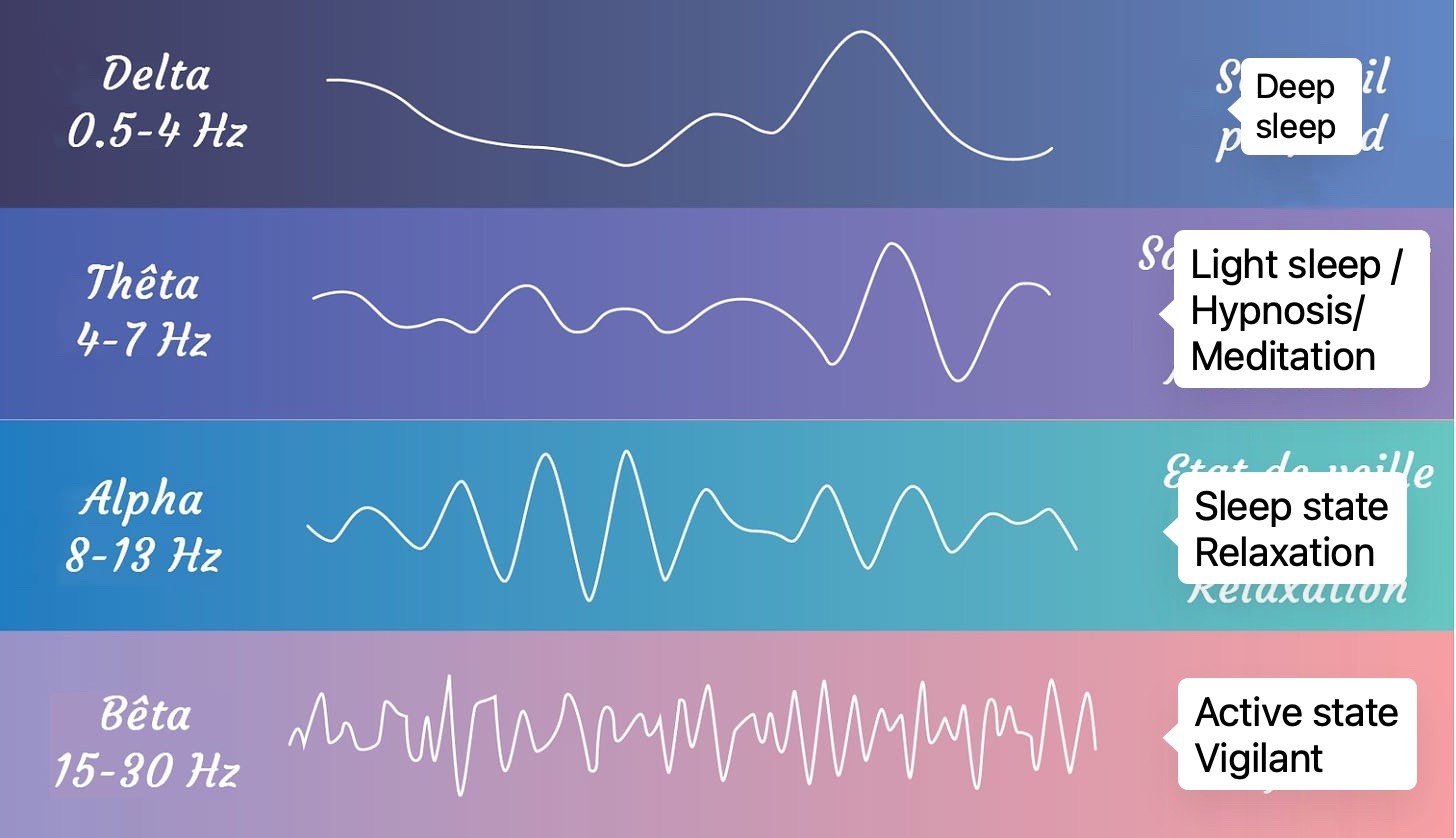
Here’s a visual representation of the different waves emitted by the brain.
Let’s move on to the habit itself. You pick up your phone from your bed, whether it’s to check your emails, messages, Instagram stories, or the TikTok feed.
You find yourself exposed to a large amount of external information. Before even uttering a word or having thought for yourself. You might say to yourself, “It’s okay, I’m waking up so I want to relax before starting the workday.”
But the exact opposite happens. This exposure is scientifically associated with greater anxiety.
Indeed, sleep is also when the brain rebalances its levels of dopamine and cortisol (the hormone associated with stress). When these hormones are activated first thing in the morning, it destabilizes them for the rest of the day.
You directly increase stress instead of allowing your brain to wake up gradually. In the vast majority of cases, there is nothing urgent and/or important.
In short, it’s crucial to take time for the macro (your priorities and direction for the day) before diving into the micro.
By taking this time offline, you clarify what you will focus on and what direction you will take.
Checking your phone first thing sets the tone for distraction for the rest of the day.
And in a world where distraction reigns, it’s those who take the time to be clear and effective who now have a superpower: the ability to create deep focus and a flow state.
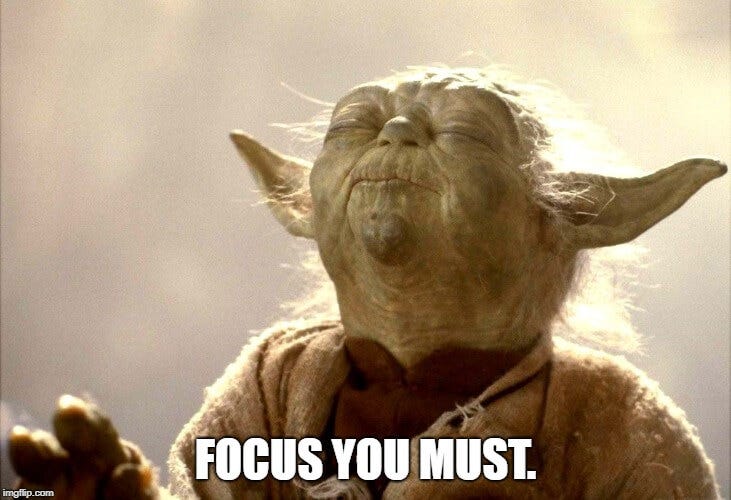

🧠 The Explanation: What are the impacts of this habit?
We tend to think that the brain rests when we sleep.
A persistent myth, though completely false. Scientific literature shows that the brain works tirelessly during the night. It sorts and then consolidates the thousands of pieces of information and memories it has processed throughout the day. It prepares the ground so that when we wake up, we are ready to make more thoughtful decisions.
The saying “the night brings counsel” finally makes sense.
🌊 From one brain wave to another
The brain functions like an electric generator, orchestrating communication between neurons.
These exchanges generate specific rhythms. When a group of neurons sends a burst of electrical impulses to another, it creates a pattern resembling a wave.
Depending on our state of consciousness, these rhythms vary. When you are in deep sleep, your brain emits delta waves.
As soon as you wake up, the brain’s electrical activity naturally produces theta waves.
This is a state of daydreaming, the frequency of deep relaxation. It is the moment where you draw your creative inspiration. It’s the perfect time to visualize your priorities and align your actions with that vision.
Then, when you are more awake but still relaxed and not processing much information, your brain begins to produce alpha waves. This is the moment when the brain is focused inward, like during meditation.
By picking up your phone as soon as you wake up and diving immediately into the Internet (#boomer), you force your body to skip the steps of emitting both theta AND alpha waves.
You jump directly from the delta state to a state of full wakefulness and alertness, also known as the beta state. By skipping these natural steps, you lose the opportunity to take the time to identify what matters and take the right direction for the day.
Psychiatrist Nikole Benders-Hadi even tells us:
| “The information overload that hits you before you are fully awake interferes with your ability to prioritize tasks.”

Here’s a visual representation of the different waves emitted by the brain.
Let’s move on to the habit itself. You pick up your phone from your bed, whether it’s to check your emails, messages, Instagram stories, or the TikTok feed.
You find yourself exposed to a large amount of external information. Before even uttering a word or having thought for yourself. You might say to yourself, “It’s okay, I’m waking up so I want to relax before starting the workday.”
But the exact opposite happens. This exposure is scientifically associated with greater anxiety.
Indeed, sleep is also when the brain rebalances its levels of dopamine and cortisol (the hormone associated with stress). When these hormones are activated first thing in the morning, it destabilizes them for the rest of the day.
You directly increase stress instead of allowing your brain to wake up gradually. In the vast majority of cases, there is nothing urgent and/or important.
In short, it’s crucial to take time for the macro (your priorities and direction for the day) before diving into the micro.
By taking this time offline, you clarify what you will focus on and what direction you will take.
Checking your phone first thing sets the tone for distraction for the rest of the day.
And in a world where distraction reigns, it’s those who take the time to be clear and effective who now have a superpower: the ability to create deep focus and a flow state.


🧠 The Explanation: What are the impacts of this habit?
We tend to think that the brain rests when we sleep.
A persistent myth, though completely false. Scientific literature shows that the brain works tirelessly during the night. It sorts and then consolidates the thousands of pieces of information and memories it has processed throughout the day. It prepares the ground so that when we wake up, we are ready to make more thoughtful decisions.
The saying “the night brings counsel” finally makes sense.
🌊 From one brain wave to another
The brain functions like an electric generator, orchestrating communication between neurons.
These exchanges generate specific rhythms. When a group of neurons sends a burst of electrical impulses to another, it creates a pattern resembling a wave.
Depending on our state of consciousness, these rhythms vary. When you are in deep sleep, your brain emits delta waves.
As soon as you wake up, the brain’s electrical activity naturally produces theta waves.
This is a state of daydreaming, the frequency of deep relaxation. It is the moment where you draw your creative inspiration. It’s the perfect time to visualize your priorities and align your actions with that vision.
Then, when you are more awake but still relaxed and not processing much information, your brain begins to produce alpha waves. This is the moment when the brain is focused inward, like during meditation.
By picking up your phone as soon as you wake up and diving immediately into the Internet (#boomer), you force your body to skip the steps of emitting both theta AND alpha waves.
You jump directly from the delta state to a state of full wakefulness and alertness, also known as the beta state. By skipping these natural steps, you lose the opportunity to take the time to identify what matters and take the right direction for the day.
Psychiatrist Nikole Benders-Hadi even tells us:
| “The information overload that hits you before you are fully awake interferes with your ability to prioritize tasks.”

Here’s a visual representation of the different waves emitted by the brain.
Let’s move on to the habit itself. You pick up your phone from your bed, whether it’s to check your emails, messages, Instagram stories, or the TikTok feed.
You find yourself exposed to a large amount of external information. Before even uttering a word or having thought for yourself. You might say to yourself, “It’s okay, I’m waking up so I want to relax before starting the workday.”
But the exact opposite happens. This exposure is scientifically associated with greater anxiety.
Indeed, sleep is also when the brain rebalances its levels of dopamine and cortisol (the hormone associated with stress). When these hormones are activated first thing in the morning, it destabilizes them for the rest of the day.
You directly increase stress instead of allowing your brain to wake up gradually. In the vast majority of cases, there is nothing urgent and/or important.
In short, it’s crucial to take time for the macro (your priorities and direction for the day) before diving into the micro.
By taking this time offline, you clarify what you will focus on and what direction you will take.
Checking your phone first thing sets the tone for distraction for the rest of the day.
And in a world where distraction reigns, it’s those who take the time to be clear and effective who now have a superpower: the ability to create deep focus and a flow state.


Your phone, your rules. Block on command and own your time.
For 30min
Everyday
On weekends
During workhours
From 10 pm to 8 am
For 7 days
All the time

Your phone, your rules. Block on command and own your time.
For 30min
Everyday
On weekends
During workhours
From 10 pm to 8 am
For 7 days
All the time

Your phone, your rules. Block on command and own your time.
For 30min
Everyday
On weekends
During workhours
From 10 pm to 8 am
For 7 days
All the time
🐣 Towards a Smartphone-Free Morning Routine
I don’t want to fall into the cliché of a miracle morning routine that works for everyone. There are even professions where it’s nearly impossible to be without your phone in the morning. The idea is to find a system that works for you, based on your activity and aspirations.
👀 Knowledge & Introspection
The first step is to become aware of the impact this habit can have on your mind and body. I hope you are a bit more aware of the theory now.
In practice, it may be useful to better understand why you do it, your internal triggers.
Ask yourself what drives you to grab your smartphone. What is the intention behind each use? Are you searching for something specific, important, and/or urgent? Or is it just FOMO?
Also, note your feelings after each use. Identifying and naming your emotions allows you to step back and gradually begin to master this habit.
Of course, you can automate this process with the app Jomo, available for free on iPhone, iPad and Mac. The app offers a “Journaling” feature that allows you to assign a feeling (either positive or negative) to each app you use (or website you visit). Then, you can associate one or more activities you engaged in (e.g., on YouTube, I “Learned new things” or simply “Wasted my time on Shorts”). It’s a great way to bring introspection to your habits in a simple manner!

🛑 Setting Boundaries
Starting with a spatial boundary.
Different degrees, from the most radical to the lightest:
Not keeping your phone in your bedroom is the most effective solution. Well, when you wake up with it, it’s more complicated. Here’s an alarm clock for 10 euros to solve the problem.
Place your phone in another part of the room and not on your bedside table. This forces you to get up to turn off your alarm, and therefore to get up and not scroll from your bed.
Put your phone in airplane mode. This forces you to unlock it upon waking, creating a small friction, allowing you a moment of reflection before doing so.
Schedule offline times with Jomo. On Jomo, you can create "disconnection time slots"—perfect if you want to unplug from your phone regularly. Just add a Rule > Recurring Session! Block "All apps except" the essentials, and you’re good to go!

🌱 Finding Viable Alternatives
Finally, to maintain control in the hour following your rise, you need to go further.
There are things that science says can be good companions for limiting phone use in the morning. The idea is to replace the source of “cheap dopamine” that is your smartphone with a more viable source. This is necessarily a bit more uncomfortable at the moment, but it will make the rest of your day more comfortable.
You can get help from Jomo. The app offers suggestions for alternative activities, with over 100 different options to try instead of using your phone. Perfect if you’re unsure what to do without your device and need a little extra inspiration.


Neuroscientist Andrew Huberman —whose podcast, Huberman Lab, I recommend, highlights several things to start your day on the right foot.
Among others:
Take a cold shower
See natural light
Exercise
To delve deeper into the neuroscientific explanation, here’s the link to the video —spoiler, it’s really great.
🐣 Towards a Smartphone-Free Morning Routine
I don’t want to fall into the cliché of a miracle morning routine that works for everyone. There are even professions where it’s nearly impossible to be without your phone in the morning. The idea is to find a system that works for you, based on your activity and aspirations.
👀 Knowledge & Introspection
The first step is to become aware of the impact this habit can have on your mind and body. I hope you are a bit more aware of the theory now.
In practice, it may be useful to better understand why you do it, your internal triggers.
Ask yourself what drives you to grab your smartphone. What is the intention behind each use? Are you searching for something specific, important, and/or urgent? Or is it just FOMO?
Also, note your feelings after each use. Identifying and naming your emotions allows you to step back and gradually begin to master this habit.
Of course, you can automate this process with the app Jomo, available for free on iPhone, iPad and Mac. The app offers a “Journaling” feature that allows you to assign a feeling (either positive or negative) to each app you use (or website you visit). Then, you can associate one or more activities you engaged in (e.g., on YouTube, I “Learned new things” or simply “Wasted my time on Shorts”). It’s a great way to bring introspection to your habits in a simple manner!

🛑 Setting Boundaries
Starting with a spatial boundary.
Different degrees, from the most radical to the lightest:
Not keeping your phone in your bedroom is the most effective solution. Well, when you wake up with it, it’s more complicated. Here’s an alarm clock for 10 euros to solve the problem.
Place your phone in another part of the room and not on your bedside table. This forces you to get up to turn off your alarm, and therefore to get up and not scroll from your bed.
Put your phone in airplane mode. This forces you to unlock it upon waking, creating a small friction, allowing you a moment of reflection before doing so.
Schedule offline times with Jomo. On Jomo, you can create "disconnection time slots"—perfect if you want to unplug from your phone regularly. Just add a Rule > Recurring Session! Block "All apps except" the essentials, and you’re good to go!

🌱 Finding Viable Alternatives
Finally, to maintain control in the hour following your rise, you need to go further.
There are things that science says can be good companions for limiting phone use in the morning. The idea is to replace the source of “cheap dopamine” that is your smartphone with a more viable source. This is necessarily a bit more uncomfortable at the moment, but it will make the rest of your day more comfortable.
You can get help from Jomo. The app offers suggestions for alternative activities, with over 100 different options to try instead of using your phone. Perfect if you’re unsure what to do without your device and need a little extra inspiration.


Neuroscientist Andrew Huberman —whose podcast, Huberman Lab, I recommend, highlights several things to start your day on the right foot.
Among others:
Take a cold shower
See natural light
Exercise
To delve deeper into the neuroscientific explanation, here’s the link to the video —spoiler, it’s really great.
🐣 Towards a Smartphone-Free Morning Routine
I don’t want to fall into the cliché of a miracle morning routine that works for everyone. There are even professions where it’s nearly impossible to be without your phone in the morning. The idea is to find a system that works for you, based on your activity and aspirations.
👀 Knowledge & Introspection
The first step is to become aware of the impact this habit can have on your mind and body. I hope you are a bit more aware of the theory now.
In practice, it may be useful to better understand why you do it, your internal triggers.
Ask yourself what drives you to grab your smartphone. What is the intention behind each use? Are you searching for something specific, important, and/or urgent? Or is it just FOMO?
Also, note your feelings after each use. Identifying and naming your emotions allows you to step back and gradually begin to master this habit.
Of course, you can automate this process with the app Jomo, available for free on iPhone, iPad and Mac. The app offers a “Journaling” feature that allows you to assign a feeling (either positive or negative) to each app you use (or website you visit). Then, you can associate one or more activities you engaged in (e.g., on YouTube, I “Learned new things” or simply “Wasted my time on Shorts”). It’s a great way to bring introspection to your habits in a simple manner!

🛑 Setting Boundaries
Starting with a spatial boundary.
Different degrees, from the most radical to the lightest:
Not keeping your phone in your bedroom is the most effective solution. Well, when you wake up with it, it’s more complicated. Here’s an alarm clock for 10 euros to solve the problem.
Place your phone in another part of the room and not on your bedside table. This forces you to get up to turn off your alarm, and therefore to get up and not scroll from your bed.
Put your phone in airplane mode. This forces you to unlock it upon waking, creating a small friction, allowing you a moment of reflection before doing so.
Schedule offline times with Jomo. On Jomo, you can create "disconnection time slots"—perfect if you want to unplug from your phone regularly. Just add a Rule > Recurring Session! Block "All apps except" the essentials, and you’re good to go!

🌱 Finding Viable Alternatives
Finally, to maintain control in the hour following your rise, you need to go further.
There are things that science says can be good companions for limiting phone use in the morning. The idea is to replace the source of “cheap dopamine” that is your smartphone with a more viable source. This is necessarily a bit more uncomfortable at the moment, but it will make the rest of your day more comfortable.
You can get help from Jomo. The app offers suggestions for alternative activities, with over 100 different options to try instead of using your phone. Perfect if you’re unsure what to do without your device and need a little extra inspiration.


Neuroscientist Andrew Huberman —whose podcast, Huberman Lab, I recommend, highlights several things to start your day on the right foot.
Among others:
Take a cold shower
See natural light
Exercise
To delve deeper into the neuroscientific explanation, here’s the link to the video —spoiler, it’s really great.
© Credits
This article is a revised version of Edition #4 of the Screenbreak newsletter created by Julien Rousset. With his permission, we're sharing this high-quality content with you today! So many thanks to Julien. 😌
Photographies by Unsplash, ScreenBreak and the Internet.
[1] Monge - Même avant de sortir du lit, les Français sont accros à leur smartphone, Le Messager, 2022.
[2] Chaney - Why You Shouldn't Check Your Phone When You Wake Up, Make Use Of, 2023.
[3] What is the function of the various brainwaves?, Scientific American, 1997.
[4] Pouessel - Tout savoir exactement de manière simple sur les ondes cérébrales, Cabinet Neurofeedback, 2019.
[5] Jansen - Podcast 436: Top 3 Healthy Digital Habits for 2023.
[6] After Skool - The Optimal Morning Routine - Andrew Huberman.
Continue reading
Continue reading
The Joy Of Missing Out

Crafted in Europe
All rights reserved to Jomo SAS, 2026
The Joy Of Missing Out

Crafted in Europe
All rights reserved to Jomo SAS, 2026
The Joy Of Missing Out

Crafted in Europe
All rights reserved to Jomo SAS, 2026

